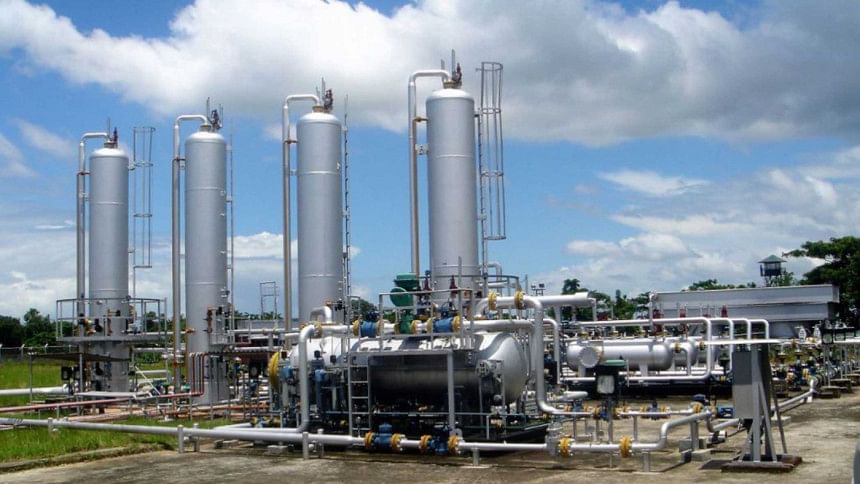Using stranded gas could cure the price hike syndrome

A declining trend of gas production from the local gas fields against an increasing gas demand has led Bangladesh to partially depend on importing high-priced liquefied natural gas (LNG). At present, more than 20 percent of the total gas supply in the country is met through imported LNG. An increase in LNG import means that the economic burden gets bigger and the government seeks to mitigate that by raising gas prices. This is what has happened now. However, the scale of gas price hike proposed this time has been widely criticised by various quarters, who termed it abnormally high and outrageous for an economically overstretched public already suffering the impacts of the Covid-19 pandemic.
The gas distribution companies have proposed to raise gas prices by 117 percent on an average, meaning that a household using a single burner stove will pay Tk 2,000 per month instead of the present rate of Tk 925, while converted natural gas (CNG) will cost Tk 76 per unit in place of Tk 35, the industries will play Tk 23 per unit instead of Tk 10, and so on. The Consumers Association of Bangladesh (CAB) rejected the proposal outright for what they termed an unethical demand, and also on the ground that the gas distribution companies have no room to ask for a gas price hike; it is the parent company, Bangladesh Oil, Gas and Mineral Corporation (Petrobangla), that may ask for a tariff increase. Whatever the mechanism may be, one thing is certain: Bangladesh is facing an economic challenge to come to terms with the LNG import bill.
There are two points of interest on the issue of gas price hike. The first one concerns the proposal of doubling the gas prices in a single stroke. Bangladesh procures LNG through two purchasing modes. One is through long-term contracts with two countries, Qatar and Oman, at a rather fixed price of USD 11 per unit, under which about 17 percent of the country's total gas supply is provided. The second one is the spot market purchase, where LNG price is unstable and volatile, under which only five percent of the total gas supply is provided. The LNG price in the spot market dipped to USD 5 per unit in the early months of 2021, but shot up to as high as USD 40 per unit in December the same year. Bangladesh, at one stage, purchased LNG from the spot market at a rate of USD 35 late last year and temporarily stopped buying because of the very high price. The suggestion that gas prices be doubled on the grounds that the spot market registers sky-high prices is not justified because of the fact that we buy only five percent of the total gas supply from the spot market. Bangladesh is likely to procure most of its LNG from long-term contracts where the price is stable.
The second point of interest is the high dependence on LNG import, which will make the economy vulnerable to negative pressure. The LNG import already costs Bangladesh dearly, and the cost will rise even more as the import volume increases over the years. A decreasing volume of local gas means a higher share of LNG in the supply chain. That will eventually lead to gas price hike. But is it inevitable for a country which is rated highly prospective for natural gas? If not, then why do we have this problem and what is its solution?
A point is often made that to make a new local gas source available, exploration and time are needed. And time is not on our side. The question is, why was there so little exploration over the last 20 years? Why did the large offshore discoveries in Myanmar and India do so little to nudge Bangladesh to explore its own offshore gas sources?
Nevertheless, Bangladesh has significant gas reserves stranded underground for reasons other than technical. The Chhatak gas field in Sunamganj with significant reserves went onstream in 1960, with a single well supplying gas to local industries. In the early 2000s, Niko Resources, a foreign company, was engaged to drill another well in the field, but the well exploded due to an accident caused by Niko's negligence in 2005. Bangladesh and Niko went to the international court for compensation settlement. Strangely enough, 17 years have passed without the case being fully settled, leaving the remaining gas in Chhatak field stranded underground. Another gas reserve in Feni, which was also given to Niko Resources, remains stranded as well.
In 2018, Bangladesh Petroleum Exploration and Production Company (Bapex) discovered a significant gas reserve north of Bhola. This gas cannot be extracted and supplied to the national grid because of the lack of a pipeline! A pipeline of a relatively short distance to cross a channel cannot be built on an emergency basis, while thousands of crores of taka is being spent to pay for LNG imports! For the same reason, gas cannot be extracted from Shahbazpur gas field, also in Bhola, in full capacity. There are other cases of stranded gas, which can be lifted with little effort—the wells in Zakiganj and Salda, for example.
Fast actions to add the gas from these fields to the national grid as soon as possible would reduce the dependency on LNG import to a large extent. It needs emergency outlook, nationalistic feeling and courage to overcome the slow bureaucratic processes with fast actions. The present administration apparently lacks these qualities.
Dr Badrul Imam is a former professor of the Department of Geology at Dhaka University.

 For all latest news, follow The Daily Star's Google News channel.
For all latest news, follow The Daily Star's Google News channel. 



Comments